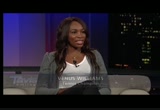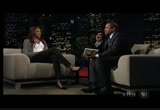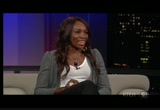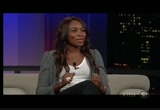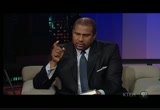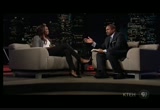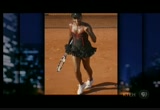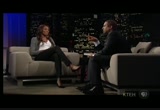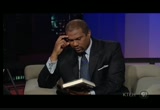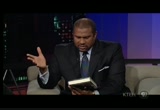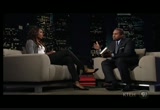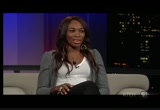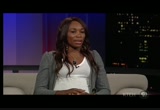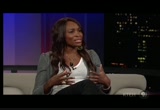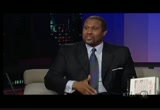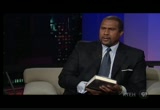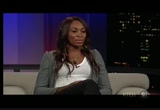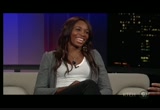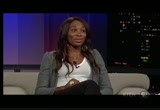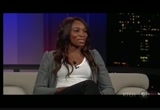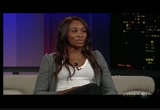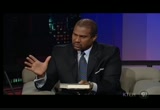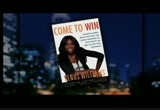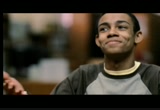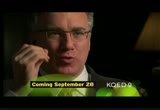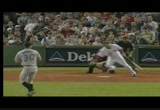tv Tavis Smiley PBS September 16, 2010 12:00am-12:30am PDT
12:00 am
tavis: good evening. from los angeles, i am tavis smiley. tonight, our conversation with tennis great venus williams. after becoming the first african-american to reach tennis' world no. 1 ranking, she has been in the force -- she has been a force in the game nearly 15 years. she has teamed up for a new book about harnessing your competitive spirit. it is called "come to win." our conversation with venus williams, coming up right now. >> all i know is his name is james, and he needs extra help with his reading. >> i'm james. >> yes. >> to everyone making a difference, you help us all live better. >> nationwide insurance supports tavis smiley. with every question and answer, nationwide insurance is happy to help tavis improve of
12:01 am
financial literacy and remove obstacles to economic empowerment one conversation at a time. nationwide is on your side. >> and by contributions to your pbs station from viewers like you. thank you. [captioning made possible by kcet public television] tavis: always pleased to have venus williams on the program. she is out with a new book about the intersection between sports and that success even for everyday people. the book is called "come to win,"and features essays from bill clinton, billie jean king, and so many more. venus is always welcome on this set because she designed the
12:02 am
set. if you look closely every night in the credits, you will see a company called the star -- you will see v starr listed in the credits. she and her company designed a whole thing. seven years later, it is holding up. >> it is holding up. thank you for not changing at. tavis: i cannot afford to change it. >> it was your vision. tavis: you still enjoy designing? >> i love design. one of my favorite projects, if you look on the website, whatever we do, it is always right there, tavis smiley. this is near and dear to me. we're doing residential design and commercial design, hotels, all kinds of things. tavis: when sir reno was here not too long ago, i ask -- when serena williams was here not too long ago, asked her what it was like living with venus, her sister. this is what she said.
12:03 am
>> i love it, because i live with the mess. every time i come home, she changes the house. now we have all new furniture. she loves designing. now we have a whole new bigger room that she knocked down all. i love it. i don't have to pay for anything. i get to live in a brand-new house every month. tavis: i want to live with you. i want to move in with you. is that true, changing things? she doesn't know where she is going because you redesigned things? >> we needed a couple of things to be done. when you don't move, you know how it is, you just remodel. we have a big family and people are coming, so we always have to make room. i have to rationalize what i am doing, basically. tavis: how is it living with your sister? you are both international stars and you hang out together. as much time as to spend
12:04 am
together, you don't get tired of living with each other? tavis: no, she coaxed. >> no, she cooks. it is horrible, because she calls me the husband. if it makes me feel itchy. she will make some food, she will say, hold on, i have to give my husband is played first. i called my mom and said you have to tell her to stop doing that. when she is home, she makes food. i live in up, and i guess i make sure she lives in nice conditions. it is a real partnership. tavis: this book, i have been involved in a few of these over my career, or you get people to give you essays. what tends to happen is you get some really strong essays and you try to put the weak ones amongst the strong ones. as i went through this book, you
12:05 am
have strong essays from a lot of important people, but their essays, you are pleased with them? >> very pleased. the stories, the content, it is so moving. some of it makes you teary eyed. the other accounts are motivational where you want to do something. the other things will hit you right where you needed -- where you need it. every story is different, but they all bring something. tavis: reading the book, and i want to ask, there is this notion that a lot of successful people make the case in the text they have learned more from losing than they ever learn from winning? >> i think it is interesting that everyone picks up on that. as an athlete, you learn from losing. you don't really get the big wins until you lose a big match.
12:06 am
you come to the breaking point where you are like, i'm going to learn from this and get better. it lifts you to the next level. the losing is important. the winning is important, too, but the losing is the catalyst. tavis: how do you look back on the beginning, not to where you are now? -- to where you are now? i know your daddy thought, these are the best work -- these are the best and the world. did you ever expect that you'd be getting all these grand slams? >> well, maybe i thought i would have some more. tavis: good answer. >> for an athlete, it is never enough. once you have success, there is always more.
12:07 am
some of the things are unbelievable. when it happens, it is on real. to make it happen is something completely different. i'm extremely excited about the success we have had, but it is never enough. tavis: when will you know, you are always asked this question -- 28, you are old, 30, you are ancient -- how much longer are you going to play? i will not ask that, when will you know it is time to stop playing? >> gosh, i would imagine the indicators would be you don't enjoy it anymore, that it seems like work, that you don't want to go to work, or that you are not any good. tavis: that is a good indicator. >> the last one as a big indicator. -- the last one is a big indicator. tavis: i have had everybody on
12:08 am
the show who is caught up in some were a controversy -- wardrobe controversy. now have you on. all the hype about your outfit, you know the outfit. >> i do. tavis: what did you make about all the conversation? >> it was really about dilution. it was not anything else or certain parts of the body. it was just about i had this idea to wear lace on the court and i said it is time to execute it. why we're that if it is just on top of black. it needed to be just lace, so i had to wear nude under it. most people are not jumping in lace, and i was jumping, diving, whatever it took to get to the ball. i would just challenging myself in design.
12:09 am
tavis: have you ever worn something in a match that you have looked back on and said, i wish i have not warn that? >> in my younger days. somebody just gave me a picture recently at a book signing. it was bad. i am so glad those days are over. i was probably only about 16, so thank god i moved away from that quickly. tavis: is it good for the sport to push and sierena the envelope the way that you do? >> i think it is good for the sport. we like to show our personalities on the court. that is another way of expressing ourselves for the fans. tavis: the moment days ago when serena said i got you billie,
12:10 am
how proud were you? >> who would have thought she would have been in this kind of match in tennis? it was a wonderful opportunity for her to bring tennis to the front and really be part of something legendary. i am not sure when the record will be broken, but i am very proud of her. tavis: how did you go about selecting some of the people who wrote in the book? why these people? >> most of them were guests on your show. really, the main link between them all is they all played sports. tavis: i went down the list. >> now that you mentioned it -- it was really about, did you play sports, and also they are
12:11 am
at the top of what they do. there are extremely successful, they have changed their game, whatever game they are in, and they have overcome obstacles. that was the wish list. when people said yes, i was excited. we would have celebration emails or phone calls. bill clinton, we were so excited. it was a real journey. tavis: when you look at some of the folk you have in the book, people like magic johnson, what do you take from the way certain individuals have made the transition successfully from the world of sport into business? what are you looking for? what are you trying to take away from those people, like magic? tavis: nowadays, it is so easy as an athlete to become a statistic. whether you lose everything or are having trouble, whatever it
12:12 am
may be. i think magic johnson is a role model for everyone, especially athletes, of how you can determine your success and turn it from on the court to off the court. he has done an amazing job being successful and giving back. tavis: so often, athletes end up a statistic. we have seen the stories this year, i don't want to call names, but i am constantly blown away when i looked at so many millions of dollars these athletes have made in the nba and nfl, and i have a hard time believing the story they are broke, they have filed bankruptcy. i don't understand how you could make all that money -- i get it, you spend more than you take in, making you broke, basically -- by speaking about not wanting to end up being a step, you have concerns about that? how do you approach your business to make sure you don't end up one of those stats?
12:13 am
>> i have always said it, it cannot happen to me, you have to say it can happen to me. if you have to be aware of it. you have to watch what you are spending, people around you, watch your finances. that takes effort. as an athlete, you are spending so much time trying to be the best, dealing with the media and everything in between that you could let it get away. i think sometimes, also not being in reality. for me, i just tried to say this could be me, so how do i make it not me? tavis: one of my sisters is visiting me and we were watching tv last night and we saw a venus commercial. my mother used to use tide all the time growing up, and then come sure commercial. i told my sister, i was going to ask you about this.
12:14 am
how do you decide, at this point in your career, with all the products and institutions and individuals who you could brand with, what is your process of figuring out who you want to be with? >> i think it is really about what works. all the partners that i have partnered with, they also give back to the committee. ittide -- tide does a great job of giving back. that is definitely on my list. also, i like to do fun things. i thought the tide commercial was very fun. when it works, it works. tavis: i assume, to your earlier point, when you are celebrating because so and so agreed to do the book, i assume you have stories that stand out for you. tell me in terms of these essays which one really resonates with you? >> there are a few.
12:15 am
i love william coins -- william quinn -- william coyne's s.a.. in the winter, he would go out and the cold. he talks about just house support prepared him for the elections and his political career and how he walked 22 miles per day in one of his campaigns, from new hampshire to canada. that really resonated with me. it was a touching, motivating story. there is one by a brain surgeon. he was in emigrant migrant worker, who came over from mexico, and he was a boxer. he really started, not even speaking english, pulling weeds. 10 years later, he was in medical school. if you could imagine that.
12:16 am
his message was never quit, and how going from failure to failure is sometimes part of success. i really enjoyed that. interesting way of looking at it, but sometimes you don't always get where you want to go, but it does not mean you are not getting their. -- getting there. tavis: how has your relationship with your father -- when you came on the scene, we got to know your dad first. he introduced us to his girls. how has your relationship with your father changed over the years? he came out first, introduced us to you all, now you all are out front and you really see your father. how has the relationship changed over the years as you have moved out front? >> well, he has gone to some money matches and practices, -- he has gone to so many
12:17 am
matches and practices, i don't know how he does it. singles, doubles, another single, 12 hours of tennis. he is a great guy and has really inspired me. if you read the preface and the book, my parents are so instrumental to where i am today. i would never have picked up a tennis racket, let alone writing a book. they really have been great, not just my dad. tavis: to the point about your dad being anxious to practice, even after all these years, even when you are the best at what you do, number one in the world, i would assume there are days and moments when you get tired of doing it, when you don't want to practice, when you are not motivated. do you have those moments? >> i enjoy my days off. when it is sunday and is my day off, i feel good. but when it is monday, i cannot
12:18 am
imagine taking that day off. i have to practice. while it is important to pace yourself and have time off, at the same time i am eager to be doing what i do. i enjoy the time off, but i really enjoyed being on the court. tavis: has your practice changed over the years? >> yes, it has. growing up, we hit all day until it became natural. that takes hours and years. now is about longevity and being easy on our bodies and ready for the matches. as opposed to the time on the court, i spend a lot of time in the gym. plus, philosophies are always changing about the exercise and how you should eat. tavis: i am thinking that you are in the gm now -- that you are in the gym now to prevent injuries. when you and your sister came on the scene, it with your physical
12:19 am
style of play. some people cannot handle it, there are a bunch of haters. it was as if you all were good because of your physique, not because you worked hard. i hated the commentators who tried to make about your physique and physicality. having said that, you guys changed the game. everybody now is in the gym, everybody recognizes physique is part of being able to successfully play against serena and venus. but now you do it mostly to prevent injuries, not anything else? >> exactly, to stay strong and stable. that is a key word for me. i have learned a lot about that. yeah, we are strong.
12:20 am
we definitely have a lot of genetics pluses, but i happen to be very fast. it is like an oxymoron, if you want to say, something strange, but at the same time, i feel like i have a strategy and i am very quick and figuring out strategy on the court. i find that to be my secret weapon because maybe somebody thinks i'm come on the court, but i got you on the backside -- maybe some the things i'm not as smart on the court, but i got you on the backside. tavis: what do you make of how the physicality has changed the game? what do you make of that process? >> i think a lot of it is obviously just genetics, some of it. a lot of it is technique. our dad had new ideas of how to play the game, more power, so it is training. he had these new ideas. in essence, he changed the game.
12:21 am
we were just the people playing the game. he does not get credit for that. tavis: i assume that you have noticed that other people have changed their game in response? >> sometimes you think, gosh, she is copying my moves. did you see how she tried to do that? we notice, but it is flattering. it is flattering that younger players, and you see them playing your game. the means they are watching and dreaming on tv they could be out there doing it, too, and it is exciting to have that part in our sport. tavis: how --only you and your sister can answer this question -- as you travel the country, travel the world, do you you -- do you visually see the impact you have an kids of color picking up tennis rackets?
12:22 am
is there evidence that the numbers are increasing? >> i am not sure exactly what the numbers are and i am not out there regularly enough at the grass-roots level. i often do kids clinics, but is usually in conjunction with education and youth centers and things like that. as far as people really going out there and training to be professionals, i definitely would love that, but i just want them to play sports. when i see kids i say, keep playing, stay in the game. sports really leads to success in other parts of your life. tavis: how a person must be -- i see all the time, here you and your sister are specimens, beautiful physique, and that has to be juxtaposed against childhood obesity, across the country. so many kids are out of shape. >> things have changed a lot even from what i was a younger person. i was always outside.
12:23 am
so much has changed with kids with tv and games and all the other things they can be doing instead of being active. it is a battle. we just have to educate kids and parents also so hopefully the next generation will bit healthier. tavis: back to v starr, how are you balancing tennis and the business and when you suspect you will start moving more into the business mode? >> i feel like i am already in business mode. it takes a lot of work to have an interior design company. takes a lot of work to have a fashion brand and design. i enjoyed that. there are a lot of times that i spend on the court, but i feel i'm starting to make that transition and i am looking
12:24 am
forward to my life after tennis, but i have to wait a while. tavis: how long? >> a few more olympics. tavis: a few more? that is like 12 years. if anybody can pull it off, venus can. it is a provocative wonderful book, called "come to win," on house sports can help your profession -- on house sports can help your profession. it is good to have you on the program. your welcome back to this at any time you want. that is our show tonight. catch me on the weekend on public radio international. access the radio podcast on our website, and i will see you back here next time on pbs. until next time, good night from l.a., and as always, keep the faith.
12:25 am
>> for more information on today's show, visit tavis smiley at pbs.org filmmaker oliver stone on his new documentary. that is next time. we will see you then. >> all i know is his name is james, and he needs extra help with his reading. >> i'm james. >> yes. >> to everyone making a difference, you help us all live better. >> nationwide insurance supports tavis smiley. with every question and answer, nationwide insurance is proud to join tavis in working to improve financial literacy and remove obstacles to economic empowerment one conversation at a time. nationwide is on your side. >> and by contributions to your pbs station from viewers like you. thank you.
12:26 am
154 Views
Uploaded by TV Archive on

 Live Music Archive
Live Music Archive Librivox Free Audio
Librivox Free Audio Metropolitan Museum
Metropolitan Museum Cleveland Museum of Art
Cleveland Museum of Art Internet Arcade
Internet Arcade Console Living Room
Console Living Room Books to Borrow
Books to Borrow Open Library
Open Library TV News
TV News Understanding 9/11
Understanding 9/11

